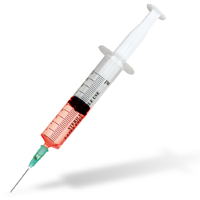If you could have your dog neutered with an injection instead of the traditional surgery, would you do it? Stephanie Taylor of Shingle Springs, Calif., already had an appointment for her 18-month-old miniature Australian Shepherd Gizmo, to be neutered surgically, but when she read about a new method of chemical neutering on a friend’s Facebook page, she decided to give it a try and signed Gizmo up at a training session for veterinarians in Southern California.
Dogs are usually neutered by surgically removing their testicles, but that may become a thing of the past.
“The fact that he would not have to have a surgical procedure appealed to me, and it sounded interesting,” she says.
The procedure, which involves injecting a zinc gluconate solution called Zeuterin into the dog’s testicles, kills sperm and scars the organs, causing permanent sterility within 30 days. Men, we know you’re flinching, but the process is painless, thanks to the use of a fine needle and a slow injection technique. Sedation isn’t necessary, but it can help. Gizmo was sedated for his procedure, Taylor says.
The administration of the drug might not rise to the level of pain, but some discomfort can be involved. Taylor says Gizmo’s scrotum was swollen (which can also occur with surgical neutering), and he whined and seemed uncomfortable.
“Because there are no nerve endings in the testicles, I can only attribute it to the pressure he was feeling as he became more swollen,” she says. “By the time we got home, he had stopped whining, but he was definitely not himself, although he was clearly not in pain.”
According to a study published in the January 2008 issue of the American Journal of Veterinary Research, complications are rare, but improper injection technique and poor management afterward can cause severe tissue damage or scrotal ulcers. Veterinarians must undergo five hours of training before being approved to administer the drug.
Recovery time is short. The manufacturer, Ark Sciences, recommends restricting dogs’ activity for a few days afterward.

Dogs who undergo chemical neutering have reduced testosterone output, but production of the hormone doesn’t disappear entirely. The testicles themselves become firmer and smaller but remain visible. That’s an advantage for some owners, who for cultural reasons may prefer dogs to look intact.
Dogs who have been undergone the procedure wear a special tag on their collar and are tattooed in the groin area with a green Z. The information can also be included on microchips.
Since the procedure, Gizmo’s behavior has changed for the better, Taylor says. He is less aggressive toward her other dogs, and his habit of urine marking has almost disappeared. She says a friend observed that Gizmo seemed calmer.
Don Cowan, marketing and communications partner for Ark Sciences, says approximately 3,000 dogs have undergone the procedure in the past two years. He expects Zeuterin, which was approved by the Food and Drug Administration last August, to become widely available in late 2013 or early 2014 at both low-cost spay and neuter clinics and private practice clinics.
Would Taylor repeat the experience with another dog?
“Yes,” she says. “I would do it sooner, when the pet was younger. It would also be great to be able to bring a pup in and wait or sit with him while the procedure was done and bring him home alert.”
No similar product is available for female dogs. Oral contraceptives have been tested in populations of feral cats, but they are not suited for use with pets because they are not 100 percent effective, says Julie Levy, DVM, Ph.D., an internal medicine specialist and associate professor at University of Florida’s College of Veterinary Medicine in Gainesville.









